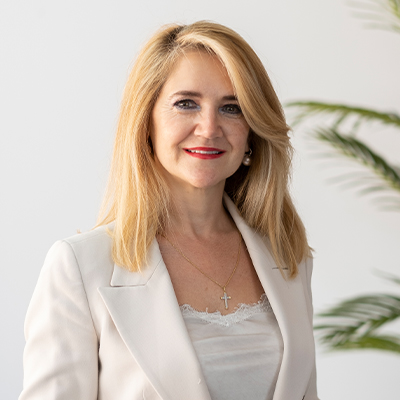I have the privilege of being part of this foundation, but above all, I am a mother with over seventeen intense years of experience raising a daughter with Autism Spectrum Disorder (ASD). Our daughter has shown us a new and unique path, allowing us to see and feel the world in a different way, day by day, minute by minute. She brings immense value to our family, including optimism, joy, a passion for life, unity, and integration.
We have learned that we must not and should not place any barriers on human beings when it comes to their education and development. We are doubly fortunate because we had the opportunity to receive early diagnoses and early interventions for our daughter, starting when she was just two years old.
To promote a culture of inclusion, it is not only necessary to provide training and tools for educators; it requires their genuine and concrete willingness, open-mindedness from authorities, social awareness that differences make us unique, parents who “educate” from the earliest ages, professionals and educators who are more generous and truly committed to teamwork, and state policies that eliminate bureaucratic barriers between education and healthcare.
Among the most common disorders that affect children’s educational processes are Specific Language Impairment (SLI), Attention Deficit Hyperactivity Disorder (ADHD), learning disorders, and cognitive developmental disorders. Additionally, sensory disorders, auditory processing disorder, and Autism Spectrum Disorder (ASD) should not be overlooked, along with syndromes such as Williams syndrome, Down syndrome, and others. If these conditions are not given the necessary and early attention, they can have consequences for their educational journey, both in primary and secondary school, as well as in their university education.
Parents should observe their child’s performance, behavior, socialization with others, and interactions. “A child is a social being with biological, psychological, and social components, and based on the responses observed in each of these components, parents can identify where the child needs more help and take the necessary measures accordingly.”
At FUNDANEED, we insist on the need to “raise awareness in society” so that “everyone” with neurodevelopmental disorders is “respected and accepted both inside and outside of school.”
It is necessary to work on improving the capacity for early identification of cases by professionals in the educational and primary healthcare fields and to define care processes that involve all disciplines potentially involved in their management.
Above all, we must provide support to families, understand the situation of their children as well as the situation of the family itself. We need to identify their needs, their main demands, and ultimately, what they require to enhance their quality of family life.
Together, let us strive for a society where every individual is valued, supported, and given equal opportunities to thrive. Your support and collaboration are crucial in creating a more inclusive and compassionate community.

